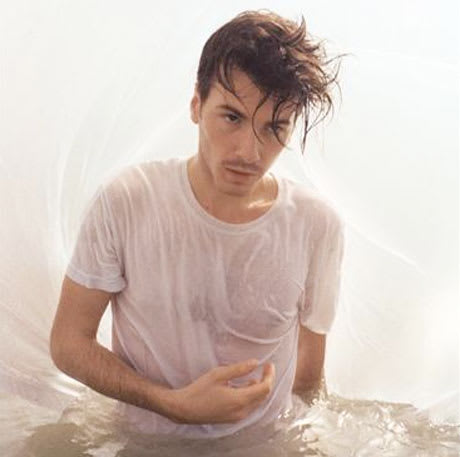Though they've been known to tour as a quartet, ERAAS' founding members Robert Toher and Austin Stawiarz represented the Brooklyn outfit all by themselves during their first visit to Vancouver. They set a mood in the dimly lit, densely fogged club, with ambient purple and glowing straws of red light serving as their only illumination. Stawiarz mostly played bass through their set, with Toher playing simple patterns on a three-piece drum kit, triggering drum machine sequences and sending reverb-drenched moans into the darkness, occasionally clambering on top of some speakers to claw at the red fog.
With themselves dressed in dark clothing, making them nigh invisible in the gloomy setting, Toher carried that sense of New York survivalism and urban decay in his tortured caterwauling. While his voice was suitably aimed at their spooky post-rock style, its dissonance was unfortunately audible through his effects. Stawiarz wasn't doing a whole lot on bass to captivate interest either. Though their aesthetic is cool — something that wouldn't be out of place on Geoff Barrow's Invada Records — their performance this evening felt as though it was missing something.
After a lengthy interlude, the Trust project helmed by Austra drummer Maya Postepski and singer Robert Alfons swarmed the darkness, joined by a touring synth player that played simple melodies and bass lines on a Nord keyboard, triggered arpeggios and occasionally knobbed it. On the whole, they didn't give much of a performance.
Postepski did have some snap on the kit, which gave a lot of life to the synthetic bass lines and their gothy synth-pop sound, but she wasn't the problem. It was Alfons, who seemed out of sorts as a frontman. Granted, he went through the motions, flailing around aimlessly like he had ennui ants in his low crotch shorts, occasionally mumbling thank you between songs. He kept trying to put a leg on monitor, but his knee kept getting stopped mid-lift by those restricting shorts.
Generally, though, Alfons' voice was as awkward as his stage presence. His inconsistent, flat tone was thankfully muffled for most of their set, only noticeable in the mix when its nerd-whine warble cut through the lower frequencies.
Thankfully, Postepski and her motionless synth pal somewhat salvaged their set. Their '80s Depeche Mode industrial pop beats were tight. The albeit thinning crowd responded well, letting out a big cheer as they started into "Sulk," the closing track from their debut album TRST. One can only imagine how good they could be with a different singer, or none at all.
With themselves dressed in dark clothing, making them nigh invisible in the gloomy setting, Toher carried that sense of New York survivalism and urban decay in his tortured caterwauling. While his voice was suitably aimed at their spooky post-rock style, its dissonance was unfortunately audible through his effects. Stawiarz wasn't doing a whole lot on bass to captivate interest either. Though their aesthetic is cool — something that wouldn't be out of place on Geoff Barrow's Invada Records — their performance this evening felt as though it was missing something.
After a lengthy interlude, the Trust project helmed by Austra drummer Maya Postepski and singer Robert Alfons swarmed the darkness, joined by a touring synth player that played simple melodies and bass lines on a Nord keyboard, triggered arpeggios and occasionally knobbed it. On the whole, they didn't give much of a performance.
Postepski did have some snap on the kit, which gave a lot of life to the synthetic bass lines and their gothy synth-pop sound, but she wasn't the problem. It was Alfons, who seemed out of sorts as a frontman. Granted, he went through the motions, flailing around aimlessly like he had ennui ants in his low crotch shorts, occasionally mumbling thank you between songs. He kept trying to put a leg on monitor, but his knee kept getting stopped mid-lift by those restricting shorts.
Generally, though, Alfons' voice was as awkward as his stage presence. His inconsistent, flat tone was thankfully muffled for most of their set, only noticeable in the mix when its nerd-whine warble cut through the lower frequencies.
Thankfully, Postepski and her motionless synth pal somewhat salvaged their set. Their '80s Depeche Mode industrial pop beats were tight. The albeit thinning crowd responded well, letting out a big cheer as they started into "Sulk," the closing track from their debut album TRST. One can only imagine how good they could be with a different singer, or none at all.
